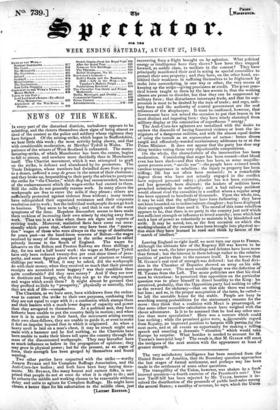Leaving England to right itself, we next turn our eyes
to France. Although the ultimate fate of the Regency Bill was known to be settled last week, the later proceedings and debates have been more than formal ; but the interest in them belongs rather to the relative position of parties than to the measure itself. It was known that M. Guizor's real trial of strength was deferred : but the final divi- sion in the Chamber of Deputies showed an array on his side stronger than ever. The most notable change was the defection of M. THIERS from the Left. The acute politician saw that his rival must be victorious: he perceived that opposition on the particular question was to place himself in direct hostility to the King : he perceived, probably, that the Opposition party had nothing to offer as the reward for obduracy—that on that side there was nothing but loss ; and so, in the proper acceptation of the term, he ratted— he left the unstable house for the stable. People are busy in searching among probabilities for the statesman's reasons for the move : they think that a coalition with MoLi: is prearranged, or that some other recondite calculation must have weighed with the clever adventurer. Is it to be assumed that he had any other mo- tive than mere speculation ? IIere was a venture which could lose nothing ; while the promised gains were, e favourable regard from Royalty, an improved position to bargain with parties for the next move, and at all events an opportunity for making a telling speech and enacting a dramatic " situation" which would take Europe by surprise. What besides is needed to account for M. THIERS'S mercurial leap ? The result is, that M. Gun= will meet the intrigues of the next session with the appearance at least of' greater strength.


























